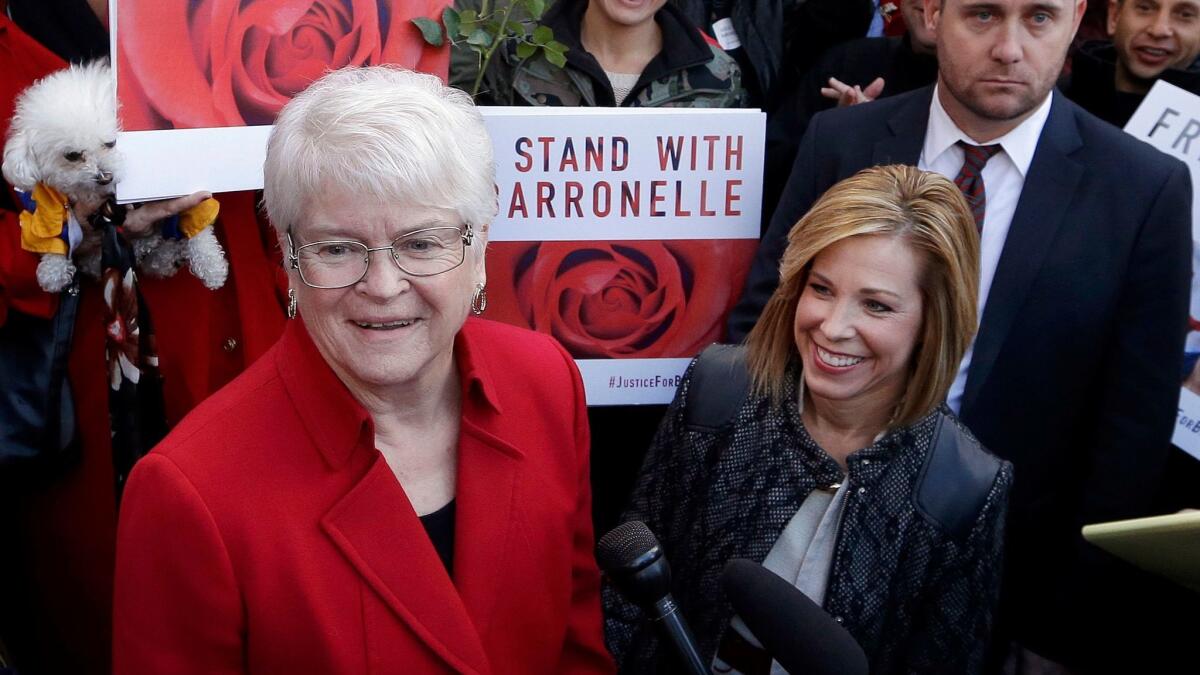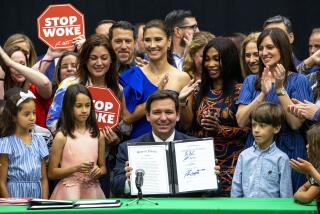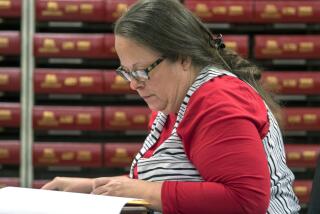Washington high court rules against florist who declined to provide flowers for same-sex wedding

- Share via
Reporting from OLYMPIA, Wash. — The Washington Supreme Court ruled unanimously Thursday that a florist who refused to provide services for a same-sex wedding broke the state’s anti-discrimination law, even though she claimed doing so would violate her religious beliefs.
Barronelle Stutzman, a florist in Richland, Wash., had been fined by a lower court for denying service to a gay couple in 2013. Stutzman said she was exercising her 1st Amendment rights.
But the court held that her floral arrangements do not constitute protected free speech and said that providing flowers to a same-sex wedding would not serve as an endorsement of same-sex marriage.
“As Stutzman acknowledged at deposition, providing flowers for a wedding between Muslims would not necessarily constitute an endorsement of Islam, nor would providing flowers for an atheist couple endorse atheism,” the opinion said.
Stutzman’s lawyers immediately said they would ask the U.S. Supreme Court to overturn the decision.
“It’s wrong for the state to force any citizen to support a particular view about marriage or anything else against their will,” Stutzman’s attorney, Kristen Waggoner, wrote in a statement issued after the ruling. “Freedom of speech and religion aren’t subject to the whim of a majority; they are constitutional guarantees.”
Gov. Jay Inslee lauded the ruling, saying it was “in favor of equality for all Washingtonians.”
“By ruling that intolerance based on sexual orientation is unlawful, the Court affirmed that Washington state will remain a place where no one can be discriminated against because of who they love,” Inslee said in a written statement.
Stutzman had previously sold the couple flowers and knew they were gay. However, she told them she couldn’t provide flowers for their wedding because same-sex marriage was incompatible with her Christian beliefs.
Washington Atty. Gen. Bob Ferguson and the couple sued Stutzman, saying she broke state anti-discrimination and consumer protection laws, and the lower court agreed. The state’s nine high court justices upheld that verdict.
The court rejected several arguments put forth by Stutzman, including the assertion that since other florists were willing to serve the couple, no harm occurred.
“As every other court to address the question has concluded, public accommodations laws do not simply guarantee access to goods or services. Instead, they serve a broader societal purpose: eradicating barriers to the equal treatment of all citizens in the commercial marketplace,” the court wrote. “Were we to carve out a patchwork of exceptions for ostensibly justified discrimination, that purpose would be fatally undermined.”
The case thrust the great-grandmother into the national spotlight, and she testified before state lawmakers in Indiana and Kansas.
Michael Scott, a Seattle attorney who worked with the American Civil Liberties Union to represent Robert Ingersoll and Curt Freed — the couple denied the flowers — had previously told justices he didn’t believe Stutzman’s floral creations constituted speech. By providing flowers for a same-sex marriage, he argued, “she’s not endorsing same-sex marriage. She’s selling what she sells.”
More to Read
Sign up for Essential California
The most important California stories and recommendations in your inbox every morning.
You may occasionally receive promotional content from the Los Angeles Times.










